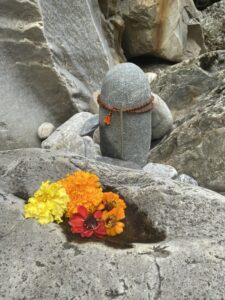When my first book was about to be published, I was very excited. I fancied myself a successful author and a soon-to-be popular yoga teacher. Even more exhilarating, Yoga Journal was dedicating a two-page spread to the book, complete with an enthusiastic review. Not only was I destined to become famous, but I might also get rich on the deal. How lucky could one guy get!
While pondering all this good fortune, the fog of my self-admiration must have broken for a moment because the following thought arose in my mind: “Would I be this happy if the book was being published anonymously and I wasn’t being paid?” For someone who had ascended to the throne of self-congratulation, this consideration was a deluge of unpleasantness. I was not very happy to suddenly have to confront this challenging notion.
It dawned on me that I would not be so thrilled if no one was to recognize the awesome person behind the book. Painfully, I was forced to attend to the fact that I was more interested in being applauded as a teacher than I was in sharing the yoga teachings. Here I had written a book about the yoga tradition and our sages guidance on devotion, love, and selfless service. My focus, however, had somehow shifted from what I had learned from the sages to how large of a stage I could prance upon. Thanks to this introspection, by the time the book and big review came out, I wasn’t able to parade myself as some big shot. Such are the yoga teachings: a curse on my attempts at self-grandeur!
When we actively and sincerely pursue the spiritual path, we learn from the sages that selfless service is essential. This means the willingness to serve others without concern for appreciation or recognition. In addition, we are called upon to love and respect others without the need for reciprocity. For the ordinary mind, these demands are the ultimate expression of unfairness. After all, it has been proposed, to be successful in this world means to gain more than we are forced to give. To give without getting is the mark of a fool, of a loser.
At the Green Mountain School of Yoga, we call this selfless service, “love tennis.” One hits the ball of love and respect over the net without anxiety for the result. In this world of ours, based on getting, it is rare that the ball is returned. In fact, some even feel threatened when love and respect are directed their way. Others try to ignore the volley, and still, others react suspiciously, “Hey, youse hittin’ that ball at me?”
In spite of our years of education and our increasing talent manipulating sophisticated gadgets, we still don’t know much about the exchange of love and respect. We don’t have the skill sets to play a good game of love tennis. Our hurry, worry, fear, and self-doubt get in the way of enjoying a good volley with others. We withdraw from intimacy and then wonder why we feel so lonely and frightened.
To be a yogi means to love others more than they will likely love you back. It means to serve others even in the face of mistrust. It means to hit the love tennis ball over the net with each breath, as long as you have breath in your body.
Many people labor through their lives in occupations they do not enjoy, waiting for the luxury of retirement. Yogis do not wait for retirement to live their passion. When passion is in the exchange of shakti, divine energy, every moment is a chance to hit the ball. We’re not saving anything for later, we are leaving everything we have on the court. At the end of our lives, we hope we will look back and, like an incense stick completely burned away, we will have poured forth all of our fragrance into the world.
When we seek to get, we remain unhappy. Satisfaction, contentment, and completion cannot be found because there is always more to get. When we seek to give, we can access our core happiness as there is always more to give. It’s really quite simple when you stop to think about things. Simple, but not necessarily easy.
Our habits of thinking of ourselves and our personal profit are deeply ingrained. This does not make us bad, malevolent, or sinful, it just makes us human. These human tendencies are the result of biological, social, and other conditioning forces. But. as yogis, we recognize that being human is not our entire identity. Transcending the body and mind, we uncover our true spiritual identity and realize the love and healing power inherent within.
The process of this uncovering takes place through sadhana, spiritual practice. Yoga is the science and art of spiritual practices. Sadhana is absolutely essential. Realization without sadhana would be like pearl hunting while sitting on the beach and expecting an oyster to wash up on your lap.
The first several months of sadhana can be delightful. It is a honeymoon period where one’s body feels better, energy becomes more robust, and the mind begins to calm down. Like all honeymoons, however, this period will not last. Deeper patterns of fear, anger, guilt, and selfishness will have their chance to rise into conscious awareness. If the yogi can allow these patterns to arise and apply his skillful means to them, they will reorganize themselves and cease to exist in their present, disruptive forms. New patterns of energy, new thought structures, and new modes of perception will result.
This new way of living provides one with a single reward: the opportunity to engage in service. The entire universe is structured so that spiritual maturity results in service. You will recognize how to help, how to care for your little corner of the universe. You’ll respond to your dharma, your calling. Most people prefer to stay the course of their own self-directed goals. Few want to make the commitment to live for the greater whole. As Baba Hari Dass told me when he gave me permission to teach, “Many people will come. If one in 100 sticks with it, that is very good.”
To be a yogi means to live as a part of the divine whole, of God. Worldly life results in feeling apart– from others, from divinity, from one’s own core. To live as a yogi will not provide any compensation. There will be no banners or proclamations. Living as a yogi is more like living in a valley of tears, as one can perceive the vast ocean of self-imposed suffering in which people swim. Like a wealthy father pleading with his children to please accept their inheritance, the yogi must wait, patiently, lovingly, for the young ones to accept what will make them healthy and happy.
If you would like a life of ease, pleasure, and social appreciation, I encourage you to stop your yoga practices before it is too late and your self-centered identity is ruined. The sages are not exaggerating– the path of yoga is one of selfless love, compassion, and giving. To be a yogi is to know that which is dark to the ego but light to the soul. It is to be, literally, out of your mind. This divine madness is called “pagala,” which means “crazy.” It is a divine madness that neither kings nor billionaires know. It is real, however, and found in the heart of a yogi, the fount from which love overflows.




